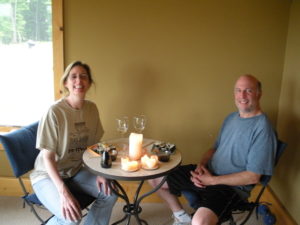(I didn’t give the whole story on the exercise thing yesterday. I’m feeling guilty about it so I will now come clean.
Aside from the future-marathon running, I have a five-week book tour coming up, starting in mid-October. My doctor said if I packed on some muscle it would improve my chances of not being a total wreck by Thanksgiving. So I hired Angelika, a trainer at my gym. I pay her to kick my butt once a week. We’re calling it Operation Booktour Beast.
I have this fantasy that if I can achieve Booktour Beastdom, I will have arms that fall somewhere between Madonna’s and Michelle Obama’s. Angelika is doubtful this will happen, but she is using my unrealistic fantasy as an excuse to pump up the pain.
After yesterday’s session, I can’t exactly lift my arms. I am typing this with my nose. All of which is a long way of saying that if today’s entry rambles more than usual or has an offensive number of typos, I’m sorry. You try typing with your nose.)
Elaine wrote:
“The main one floating across my brain that won’t go away is…what if you’re at the point of getting “good” rejections (aka feedback, compliments on writing, invitations to submit other future material to them, etc.) but they just “didn’t fall in love with it”? How do you keep going or improve your writing in those vague circumstances?
I suppose getting good rejections is better than getting the form ones, but it also means I’m not seeing what I can improve. It’s just a matter of “it’s not for them.” Have you ever encountered this, or what would be your advice to writers who are?”
We call those “quality rejections” at my house. They are a good excuse to break out the champagne. Seriously. Editors don’t have to take the time to send that to you. They don’t have enough time to go to the bathroom most days. So if one of them gave you feedback and asked you to send more you are ….. almost …… there.
But it doesn’t feel that way, does it?
 Few things are quite as painful or devastating as a rejection letter, even a nice one. I’ve heard rumors that there are a couple authors out there who have never been rejected. I hate them.
Few things are quite as painful or devastating as a rejection letter, even a nice one. I’ve heard rumors that there are a couple authors out there who have never been rejected. I hate them.
I have an enormous file of rejections letters, including the one sent to me about SPEAK and the several sent about FEVER 1793. Those books earned lots of quality rejections. It was maddening.
The tough part is that sometimes a book can be completely awesome, but it is truly not for that particular editor. OR it could be that the book just isn’t good enough yet, but the editor sees some talent in your pages and wants to encourage you.
How can you tell the difference?
You can’t.
So what should you do?
First, do some homework. What were the last ten books that the editor who rejected you edited? Have you sent a historical to someone best known for editing sci-fi? (Make a habit of paying addition when an author thanks her editor in the acknowledgements of a book. You can learn a lot!)
If you come to the painful conclusion that your story just wasn’t good enough, do not despair. Put it away for three months and get to work on another project. Right now. In three months, pull the rejected story out and see if you can figure out how to revise it to make it stronger. If it still looks perfect to you, stick it back in the drawer. If you let it simmer undisturbed long enough, all of the awkward plot points and clunky phrases will magically float to the surface and you will fix them. But it takes time.
Here is a critical point: make sure your next project has a deep connection to you. If you are writing stories just because you think they are trendy, you are severely reducing your chances of being published.
It takes most people about ten years to break into children’s publishing. If you are getting quality rejection letters, your ticket will soon be punched, I swear.
Have a writing question for me? Put it in the Comments section, pretty please!
Ready….
“We are not interested in science fiction which deals with negative utopias. They do not sell.” rejection letter for Carrie, by Stephen King
Set… file your rejections and turn your eyes to the future.
Today’s prompt:
2. Write down its name then list ten things that the name or the color itself make you think of.
3. Here’s the tricky part. Write ten verbs that spring to mind when you look at that color or its name.
4. Choose the verbs and nouns that resonate the most with you. Write a scene that uses those things and verbs OR go off on an extended riff about what associations those words create for you.
5. Bonus points: Do the exercise again with a different color. This time, combine the nouns from Color One with the verbs from Color Two.
Scribble…Scribble…Scribble!!!





